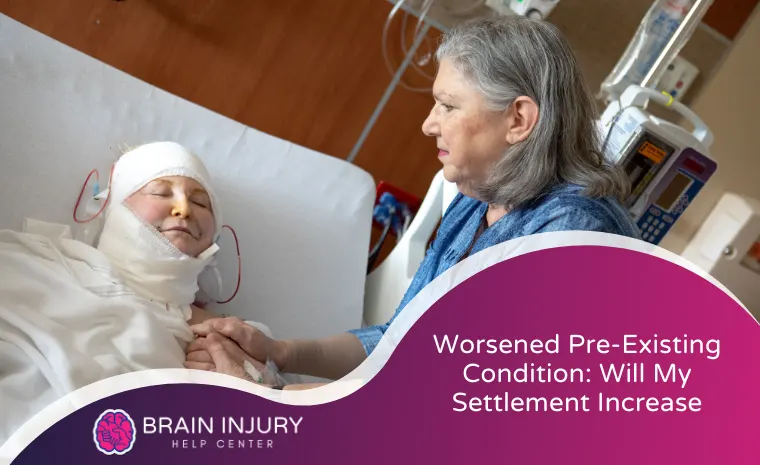Navigating the aftermath of an accident can be an overwhelming experience, particularly when dealing with the complications of worsened pre-existing health conditions. Whether you’ve been involved in a car crash, workplace incident, or any other form of personal injury, the impact on your health can be profound.
If you find yourself in this situation, it’s natural to feel stressed and uncertain about your options. Questions about your settlement, insurance coverage, and legal rights may weigh heavily on your mind, adding to the already considerable burden of managing your health.
For those reasons, we’ll explore the implications of a worsened pre-existing condition on your settlement, and outline the steps you can take to protect your interests. From understanding how pre-existing conditions factor into a claim to seeking expert legal guidance, we’ll provide insights and reassurance to help you move forward with confidence during this challenging time.
What Is a Pre-Existing Condition?
A pre-existing condition refers to any health issue or medical condition that existed before the accident or incident in question. These range from chronic illnesses like diabetes or hypertension to previous injuries such as fractures or concussions,and may include:
- Prior head injuries: Individuals who have sustained head injuries in the past may be more susceptible to further brain trauma, potentially leading to worsened symptoms and complications after a subsequent accident.
- Neurological disorders: Conditions such as epilepsy, multiple sclerosis (MS), or Parkinson’s disease may predispose individuals to increased vulnerability to brain injuries or exacerbate symptoms following an accident.
- Mental health conditions: Pre-existing mental health issues such as depression, anxiety disorders, or post-traumatic stress disorder (PTSD) can impact the severity and recovery process of traumatic brain injuries, complicating treatment and rehabilitation.
- Age-related factors: Older adults may have age-related cognitive decline or degenerative neurological conditions like Alzheimer’s disease, which can influence the presentation and prognosis of traumatic brain injuries.
Note that pre-existing conditions do not necessarily disqualify individuals from seeking compensation, but they can complicate the legal and medical care aspects of a claim, requiring a careful evaluation to establish the extent to which the accident exacerbated the existing condition.
The Legal Perspective: Understanding CACI 3927
CACI 3927, also known as “Aggravation of Pre-existing Condition,” guides jurors and judges in cases where an accident exacerbates a pre-existing health condition, helping to clarify the legal principles involved in determining fault and calculating compensation.
For claims in California, CACI 3927 can have a profound impact on the outcome of the case. When presenting evidence to support your claim for aggravated pre-existing conditions, you and your lawyer must demonstrate how the accident directly contributed to the worsening of the existing health condition. Otherwise, your opponent may minimize their liability by arguing that pre-existing conditions were the primary cause of your injuries, reducing the amount of compensation owed.

The Role of a California Brain Injury Lawyer
When facing a claim involving a worsened pre-existing condition, a California brain injury lawyer by your side can make all the difference. They understand the challenges associated with TBIs, health insurance companies, and the aggravation of pre-existing conditions, and possess the expertise to assess the medical evidence, gather relevant documentation, and build a compelling case.
From the outset, your lawyer will provide guidance, helping you understand your legal rights and options in pursuing a settlement claim. They will work closely with medical care experts to evaluate the extent of your injuries and, more importantly, a California brain injury lawyer will provide support during what can be a challenging and emotionally taxing time.
By entrusting your case to an experienced lawyer, your rights will be protected, allowing you to focus on your recovery and obtain justice and fair compensation for the harm you’ve endured due to the worsening of your pre-existing condition.
Documenting Your Condition and Building Your Case
Documenting the worsening of a pre-existing condition following an accident is crucial for building a strong case and pursuing fair compensation. Here are some practical steps to take so:
Seek Medical Attention
It’s essential to seek medical attention after the accident, even if you believe your pre-existing condition has worsened only slightly. Medical records documenting your post-accident symptoms and any changes to your health are critical evidence.
Keep Detailed Records
Maintain detailed records of all medical appointments, treatments, and medications related to your worsened condition. This includes any diagnostic tests, imaging scans, health insurance plans and specialist consultations.
Follow Your Treatment Plan
Adhere to your doctor’s and health insurers recommended treatment plan and attend all follow-up appointments. Not following medical advice can undermine your credibility and weaken your case.
Document Symptoms and Limitations
Keep a journal about the symptoms, pain levels, and limitations resulting from the worsened condition. Describe how the accident has affected your daily activities and quality of life.
Obtain Expert Testimony
Your lawyer can help you obtain expert testimony from medical specialists, such as neurologists or neuropsychologists, to evaluate the impact of the accident on your pre-existing medical condition. Expert testimony can provide valuable insight into the causation and severity of your injuries.
Gather Supporting Evidence
In addition to medical records, gather any other relevant evidence, such as accident reports, witness statements, and photographs of the scene. This evidence can help corroborate your account of the accident and strengthen your case.
Conclusion
Navigating the aftermath of an accident that worsens a pre-existing condition can be daunting, but with the right support and guidance, there is hope for achieving a fair settlement.
Now you know the importance of seeking the assistance of a skilled California brain injury lawyer, how documenting your condition can build a strong case, and most importantly, that you don’t need to navigate this challenging life event alone.
Legal support is available to help you pursue justice and fair compensation for the harm you’ve endured. By taking proactive steps to protect your rights and seeking the assistance of a legal professional, you can move forward with confidence and hope for a brighter future.









